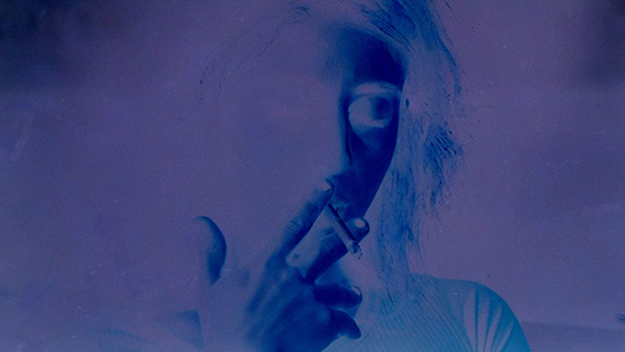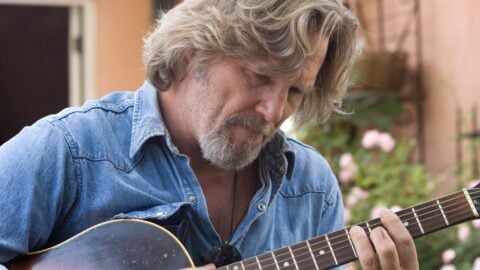Community Engagement
This article appeared in the October 12, 2023 edition of The Film Comment Letter, our free weekly newsletter featuring original film criticism and writing. Sign up for the Letter here. Read and listen to all of our coverage NYFF61 here.

Mast-del (Maryam Tafakory, 2023)
The shorts screening in this year’s Currents section at the New York Film Festival, collectively marking a kind of Christmas for the city’s experimental community, feature new work from a rogue’s gallery of talented alumni including Luke Fowler, Joshua Gen Solondz, Steve Reinke, Kevin Jerome Everson, and James Edmonds, plus NYFF debuts by a number of rising artists. Representing a range of formal techniques, the programs variously attest to the endurance of celluloid as the medium of choice, the power of digital technology as a more accessible alternative, the sublimation of narrative in favor of suggestion and sensation, and, most universally, the ability of artists to create in spite of a larger cultural climate overwhelmingly hostile to art.
Ayo Akingbade, the U.K.-based artist whose short film Jitterbug (2022) screened in this year’s New Directors/New Films festival, returns with The Fist, a precisely composed portrait of the interplay between human and machine labor at a Guinness brewery in Ikeja, Nigeria. We see the workers clock in, perform a number of tasks in service of the churning apparatuses that mechanize the canning of the beverage Malta Guinness, break for lunch, and then perform more repetitive tasks. Unlike Wang Bing’s NYFF Main Slate standout Youth (Spring), another notable entry in the long tradition of the factory film, The Fist offers us no insight into the interiority of the workers; instead, we’re merely witness to the way their bodies are subordinated to automation in the 20th century’s ur-example of what Thomas Elsaesser, in a text about the factory-set films of Harun Farocki, calls “artificial environments carefully designed to permit the friction-free sequencing of production processes.” The great innovation of the 21st century, which The Fist alludes to, is the dislocation of these processes to formerly colonized countries by corporations based in the countries which colonized them (Guinness, the famously Irish beer, is owned by Diageo—a British company).
Shambhavi Kaul manifests another kind of rhythmic interplay between the animate and inanimate in her film Slow Shift, depicting langur monkeys amid a sprawling, rocky landscape in Hampi, India, marked by traces of both human and geological transformation. Kaul’s invigorating montage spans the hours from sunrise to sunset, with an intense aural waterfall of tumbling, crumbling, and mystical synth layered over a carefully paced sequence of shots.
Sharp 16mm cinematography by Josh Gibson; precise, rhythmic edits—which create a kind of repetitive Kuleshov effect among the monkeys, rocks, and landscape—by Lalitha Krishna; and tense, avalanche-like sound design by Jason Sudak make this an exceptional team effort, echoing both the synchronicity and frictions of the world’s animal, mineral, and man-made dimensions. Watching it, I was drawn to philosophical musings. As I absorbed a push-pull between the mysteriously moving rocks and the impenetrable gaze of the monkeys, I wondered, “Is this a dance of opposition, or a singular world contemplating itself?”
Many of the films in this year’s Currents programs take a personal approach that imbues more abstract techniques with a bracing directness. Among the best of these is Shiraz- and London-based filmmaker Maryam Tafakory’s damning and visceral Mast-del, which combines excerpts from Iranian films with intimate personal footage, all unified and made fluid by conversion to negative images. A text overlay conveys the first-person story, more poetry than prose, of the narrator in bed with another woman, recounting the police brutality visited upon a boy she appeared in public with in Iran. It’s as much a film about memory as about oppression, sexuality, the body, shame, religiosity, images, and cinema. She did not even love the boy, she laments (the woman may be another story). Film clips illustrating the plight of the young man alternate with close-ups of fingers and hair and nipples, producing a claustrophobic, sensory effect. Doors slam repeatedly; paranoia stalks privacy. “I am safe,” the narrator writes, presumably no longer in Iran. “But I don’t feel it.”
Indigenous filmmaker Adam Piron’s Dau:añcut (Moving Along Image) is another argument in favor of artistry rooted in the personal. Piron uses smartphone screen-recordings to juxtapose TikTok/Instagram footage of Fort Sill—a U.S. Army base in Oklahoma built on land stolen from the Kiowa, Comanche, and Apache tribes during the so-called Indian Wars—with the story of a friend’s discovery, by way of the internet, that his warrior grandfather’s image has been tattooed on a Ukrainian soldier’s arm. Piron and his friend pose and interrogate an analogy between colonization and the present-day appropriation of Indigenous imagery and culture. While the friend admits to not being particularly offended by the tattoo, excusing the soldier’s “naïvete” and criticizing more hostile instances of appropriation, a news clip appearing in an animated TikTok video reveals the inextricable entanglement of the fetishization of Native American culture and the United States’s ongoing military occupation of the land: as it turns out, Ukrainian soldiers are being trained at Fort Sill. There’s another, larger irony at play in the film, of a Native tribe’s capitulation to flattery by the forces responsible for its destruction. Dau:añcut begins with footage of a U.S government ceremony dedicating a “Kiowa helicopter” in honor of the tribe, and ends with tribe members at the ceremony performing a traditional war dance. Like Tiffany Sia’s Do Not Circulate (NYFF ’21), which explicitly analyzes the dynamics at play in the proliferation of violent images on social media, Dau:añcut leaves one thinking about the role of passive viewing in perpetuating oppression.
Inney Prakash is a film curator and writer based in New York City.







